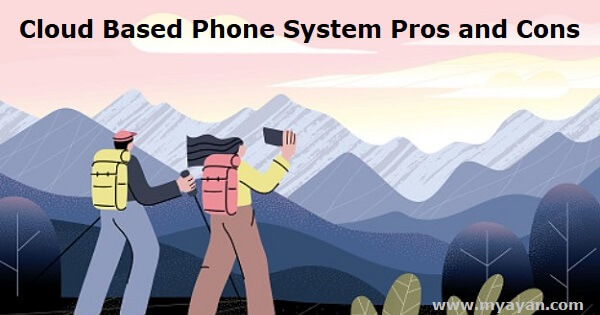According to the latest data, around 96% companies make use of cloud based phone systems. A cloud-based phone system is a VoIP phone system that uses the internet to route calls. Cloud-based phone systems are often cheaper and more scalable than traditional on-premises PBX systems. They can be used by small businesses with a few employees, all the way up to large enterprises with thousands of employees. There are several pros and cons of cloud based phone systems especially when you have a business up and running and need to save money.
The traditional telephone system entails the on-premises installation of telephone systems by connecting all extensions of the company's phone and then connecting them to the public telephone networks. Modern on-premises telephone systems include VoIP services.
Cloud-based systems, on the contrary, enable the linking of a brand's extension numbers to the internet. In the case of on-premise telephones that use desk phones, cloud-based telephone systems use softphones.
There are many pros of cloud-based phone systems. Let's look at each one of them.
With a cloud-based phone system, all you need is a reliable internet connection and a compatible VoIP phone. There's no need for an on-premises PBX system or any other hardware. This can save your business a lot of money upfront as you won't need to invest in any expensive equipment.
Cloud-based phone systems are very easy to scale up or down as your business grows. If you need to add more users, you can simply add them to your account. There's no need to purchase additional hardware or make any changes to your existing infrastructure.
Since cloud-based phone systems are hosted in the cloud, you can access them from anywhere in the world. All you need is an internet connection and a compatible VoIP phone. This is ideal for businesses with employees who work remotely or often travel for business.
Cloud-based phone systems are typically much cheaper than traditional on-premises PBX systems. There's no need to invest in expensive hardware or pay for maintenance and upgrades. In addition, many cloud-based phone systems offer features like unlimited calling and voicemail-to-email that can save your business money.
Cloud-based phone systems offer a lot of flexibility when it comes to features and functionality. You can easily add or remove features as your business needs change. Additionally, you can usually customize your caller ID, voicemail greeting, and auto-attendant to match your brand. This is one of the highly featured pros of cloud-based phone systems.
There are also some potential disadvantages of cloud-based phone systems that you should be aware of. Let's take a look at each one.
In order to use a cloud-based phone system, you need to have a reliable internet connection. If your internet goes down, so does your phone service. This can be a major problem for businesses that rely heavily on their phones for day-to-day operations.
While most cloud-based phone systems have 99.9% uptime, there are still occasional outages. This means that your phone service might not be available when you need it the most. This problem may result in huge losses which can add to the cons of cloud based phone systems.
Some businesses are hesitant to store sensitive data in the cloud. However, most cloud-based phone systems use the same encryption standards as on-premises PBX systems. Additionally, you can usually add additional security measures like two-factor authentication to further protect your account.
In order to use a cloud-based phone system, you need to have compatible VoIP hardware. This can be a problem for businesses that already have traditional phones or PBX systems in place.
Cloud-based phone systems might not be suitable for businesses with very specific needs. For example, businesses that need to host their own PBX system for compliance reasons might not be able to use a cloud-based phone system.
Cloud-based Phone System Pros and Cons-Conclusion
Now that you know the pros and cons of cloud-based phone systems, you can decide if they're right for your business. If you're looking for a cost-effective and scalable solution, then a cloud-based phone system might be a good option. However, if you need a 100% reliable phone service, then an on-premises PBX system might be a better choice.

The pros of cloud-based phone systems include lower costs, increased flexibility, and the ability to access your system from anywhere. The cons include the need for a reliable internet connection, security concerns, and the possibility of outages.
It depends on your specific business needs. If you're looking for a cost-effective and scalable solution, then a cloud-based phone system might be a good option. However, if you require a 100% reliable phone service, then an on-premises PBX system might be a better choice.
In order to use a cloud-based phone system, you need compatible VoIP hardware and a reliable internet connection.
There are many potential security concerns associated with cloud-based phone systems. One of the biggest is that data centers may be located overseas, which could increase the risk of data breaches or other cyberattacks. Additionally, some worry about whether their private information will be protected and kept secure when using these systems.